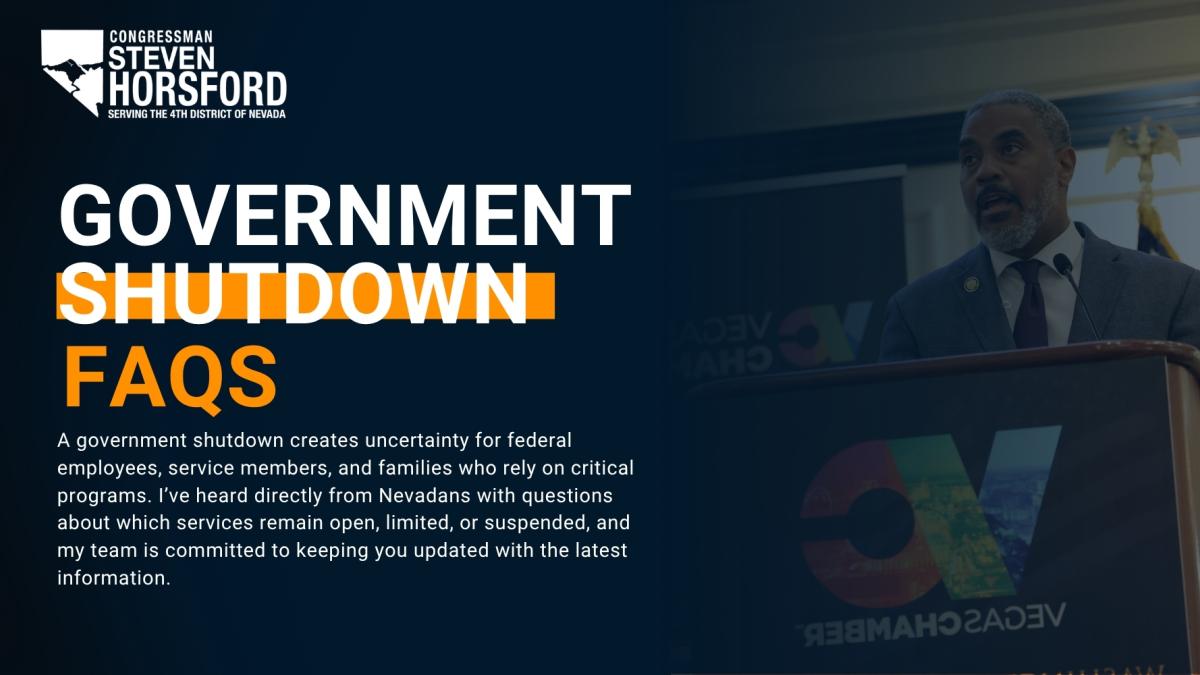Government Shutdown FAQs

- Why does the government shut down?
- What government services and programs are impacted during a government shutdown and what effect does this have on me?
- Will I continue to receive my Social Security checks?
- What happens to veterans' services?
- Will Medicare and Medicaid be interrupted?
- What is the impact on food assistance?
- What happens to federal employees during a shutdown?
- Which federal employees keep working during a government shutdown?
- What is the impact on U.S. military personnel and federal law enforcement?
- Will air travel be affected?
- Can I get a passport during the shutdown?
- Will I be able to continue visiting the national parks during the shutdown?
- What is the impact on housing?
- What is the impact on small businesses?
- What is the impact on federal student loans?
Why does the government shut down?
A shutdown occurs when Congress fails to pass legislation funding federal agencies and programs. The fiscal year ends on September 30, so if no appropriations bill is enacted by then, Congress must pass a temporary measure called a continuing resolution (CR) to extend current funding. Without either an appropriations bill or a CR, the government shuts down due to a lack of authorized funding.
What government services and programs are impacted during a government shutdown and what effect does this have on me?
Each federal agency follows a shutdown plan overseen by the Office of Management and Budget (OMB). These plans specify which operations stop and which continue. Nonessential activities pause, and many employees are furloughed. Essential functions – many of which are related to public safety – continue, with back pay provided once funding resumes. In prior shutdowns, border protection, air traffic control, law enforcement, in-hospital medical care, and power grid operations continued. By contrast, past shutdowns halted FDA inspections, some immigration court hearings, and, in some states, funding for Temporary Assistance for Needy Families (TANF).
Will I continue to receive my Social Security checks?
Yes. Recipients will continue receiving Social Security and SSI checks. The Social Security Administration will provide limited services, such as card issuance and benefit applications, but suspend tasks such as benefit verifications and processing overpayments. Customer service delays are likely.
What happens to veterans' services?
All Veterans Affairs hospitals and clinics remain open, and benefits continue to be processed. Some services, such as transition assistance, career counseling, and cemetery maintenance, may be suspended.
Will Medicare and Medicaid be interrupted?
Benefits continue if the shutdown lasts fewer than three months. However, about half of the Centers for Medicare & Medicaid Services staff are expected to be furloughed, so wait times and service delays are expected.
What is the impact on food assistance?
Supplemental Nutrition Assistance Program (SNAP) benefits continue temporarily using USDA contingency funds, which typically last about a month. A prolonged shutdown could exhaust these funds. The Special Supplemental Nutrition Program for Women, Infants, and Children (WIC) will quickly run out of funding and be unable to provide food for families in need.
What happens to federal employees during a shutdown?
Federal agencies must classify employees as either “excepted” or “not excepted.” Excepted employees continue working without pay, while non-excepted employees are furloughed.
Which federal employees keep working during a government shutdown?
Federal agencies must classify employees as either “excepted” or “not excepted.” Excepted employees continue working without pay, while non-excepted employees are furloughed.
What is the impact on U.S. military personnel and federal law enforcement?
Active-duty service members, Guard, and Reservists on orders must work without pay. Emergency and inpatient care at DoD facilities continues, while elective procedures stop. Tricare coverage remains intact. On-base childcare may stay open depending on resources. Federal law enforcement officers also continue working without pay.
Will air travel be affected?
Air traffic controllers, Transportation Security Administration officers, and Customs and Border Protection agents remain on duty without pay.
Can I get a passport during the shutdown?
Yes. Passport services generally continue, though local offices located in closed federal buildings may face disruptions.
Will I be able to continue visiting the national parks during the shutdown?
Services that require National Park Service staff—such as trash removal, campground operations, and concessions—may be suspended. Closures are determined on a location-by-location basis.
What is the impact on housing?
The Federal Housing Administration will stop approving applications for new housing loans, creating delays in development, rehabilitation, and refinancing that can linger after the shutdown.
What is the impact on small businesses?
The shutdown will stop processing new loan applications, cutting off a key source of capital for small businesses.
What is the impact on federal student loans?
Federal Direct Student Loans and Pell Grants continue for a limited time under mandatory funding. However, with reduced staff at the Department of Education, processing and servicing slow down.
